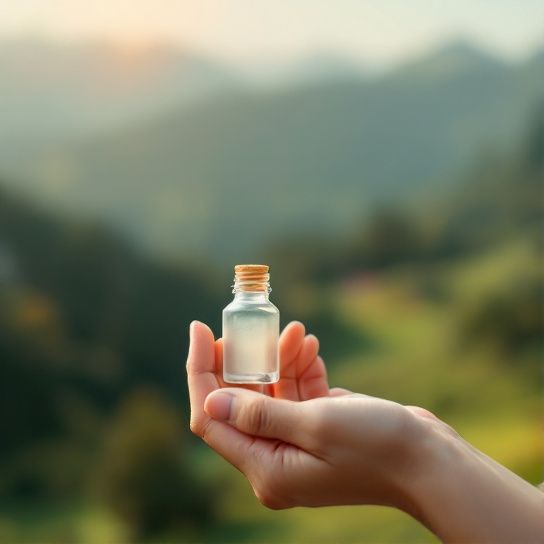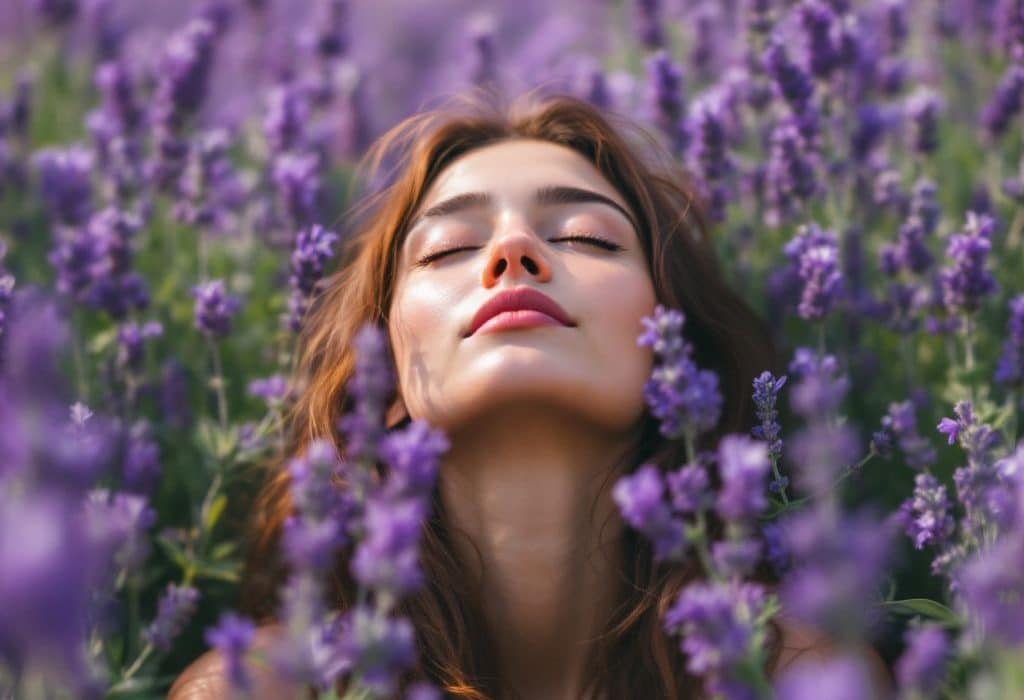Ever catch a whiff of lavender and suddenly feel like you’ve been whisked away to a tranquil lavender field in Provence? Those little purple flowers pack a powerful punch. There’s something truly magical about their calming scent. Now, imagine bottling that serenity and applying it directly to your skin. That’s the charm of incorporating lavender into your natural skincare routine.
The Alluring Appeal of Natural Skincare
Let’s kick things off by exploring why natural skincare, with a special focus on lavender, is causing such a buzz. It’s not just about following a green trend or hopping on the organic bandwagon—it’s about soothing, safe, and effective skincare. Remember when using a new face cream felt like playing roulette with your skin? With natural skincare, like using lavender oil, those worries fade away, replaced by peace of mind knowing exactly what you’re putting on your body.
Lavender’s Legacy: A Brief History
Before we dive in deeper, a bit of background. Lavender’s been around the block—dating back at least as far as Roman times. Known for its antiseptic and calming properties, lavender was often tossed into baths (hence “lavare,” the Latin root of lavender, meaning “to wash”) to both cleanse and soothe the spirit.
Why Lavender? The Skin Benefits You Shouldn’t Miss
Alright, ready for the good stuff? Of course, lavender smells incredible, but that’s just the beginning. Applying lavender to your skin can soothe irritation, combat acne, and even smooth out those tiny wrinkles trying to ruin our day. Perfect, right? Here’s a breakdown:

1. Soothe Your Skin Woes
Lavender isn’t just a pretty face. Its anti-inflammatory properties can calm inflamed skin, making it a jack-of-all-trades for dealing with irritation or redness. Think of it as that chill friend who’s always cool, calm, and collected.
2. Bye-Bye, Acne
Breakouts are never fun; lavender helps keep them at bay with its antibacterial properties. It’s not simply about masking the problem but addressing it at the root. Won dastardly pimples poke their head? Lavender offers a gentle yet firm goodbye.
3. Anti-Aging Ally
Not sold yet? Try lavender’s promotion of skin regeneration and improved skin tone and texture. It can reduce signs of aging like fine lines and wrinkles. Remember the grandma who always had the softest skin? Yeah, she was probably using lavender.
How to Use Lavender in Your Natural Skincare Routine
Okay, let’s dig into the nitty-gritty of incorporating this powerhouse into your skincare routine. Here’s where things get seriously practical:
Step 1: Lavender Oil Application

Start with few drops of lavender essential oil; dilute it with a carrier oil like jojoba or coconut oil. This helps avoid any skin irritation. Gently massage it on your face in upward motions before hitting the hay. Let nature work her magic overnight.
Step 2: Lavender Facial Steam
Ditch the spa for a night, fill a bowl with hot water, and add a couple of lavender essential oil drops. Drape a towel over your head, lean forward, and let the steam envelop your face. Relax for 5–10 minutes, letting those pores open up, clear out, and soak in the soothing properties.
Step 3: Lavender Infused Face Masks
DIY face masks can be quick, fun projects. Mix a tablespoon of honey with a couple of drops of lavender oil. Spread on, relax, and rinse after 15 minutes. Repeat weekly for that enviably glowing skin.
Common Mistakes: What to Avoid When Using Lavender
Even when the path to perfect skin is paved with lavender petals, we can sometimes trip. Here are a couple of oopsies you can easily dodge:
**Over-Applying**: Lavender’s potent. Less is more here. Overdoing it can irritate your skin rather than soothe.
**Inadequate Dilution**: Never forget to mix essential oils with a suitable carrier. Jumping the gun here and applying it directly can be harsh for sensitive skin. Play it safe!

**Sun Sensitivity**: Post-lavender face treatment, give the sun some shade. Lavender can increase photosensitivity. Enjoy your glow indoors for a wee bit after.
Lavender vs. Other Natural Skincare Ingredients
Wondering how lavender stacks up against other heavy hitters in the natural skincare world? Here’s a quick comparison:
| **Ingredient** | **Primary Benefits** | **Use Cases** |
|---|---|---|
| —————— | ——————————————————– | ———————————————— |
| **Lavender** | Soothe inflammation, reduce acne, lighten wrinkles | Facial oils, steam, masks |
| **Tea Tree Oil** | Antimicrobial, used for acne-prone skin | Spot treatment, facial cleansers |
| **Aloe Vera** | Deep hydration, soothing for sunburn | Moisturizers, cooling gels |
| **Rosehip Oil** | Rich in Vitamins A, C, and E, diminishes scars | Night oils, mixed in creams |
Each brings something beautiful to the table, but lavender wins in its calming, anti-inflammatory properties that serve both the skin and the senses.
Final Thoughts: Lavender’s Rewarding Simplicity
If there’s one thing to take away from all this lavender love, it’s that sometimes a simple, natural approach promises the most effective results. There’s a quiet sophistication in lavender’s simplicity, a return to basics that resonates deeply in today’s fast-paced world. The phrase “less is more” is, after all, a no-nonsense truism in natural skincare, with lavender leading the charge.
You won’t just feel like you’ve spent an afternoon basking under the Provençal sun, you’ll see the tranquil transformation it grants your skin. So, step off the treadmill of over-complicated skincare rituals once in a while, and let lavender set the pace in your skincare journey. It’s kind, it’s caring, and best of all—it’s yours to enjoy with every calming application. Happy glowing!
Frequently Asked Questions
What are the benefits of using natural skincare products?
Natural skincare products offer several benefits, including being gentler on the skin, reducing the risk of irritation and dryness, and providing nourishment through nutrient-rich and antioxidant-rich ingredients. They are also free from harsh chemicals, artificial colors, and fragrances, making them suitable for sensitive skin. Additionally, natural skincare products can help prevent premature aging and are more environmentally friendly[1][3][5>.
How do natural skincare products differ from traditional skincare products?
Natural skincare products are primarily composed of ingredients derived from plants, animals, or minerals, with minimal or no chemical or synthetic substances. In contrast, traditional skincare products often contain harsh chemicals, preservatives, and synthetic ingredients that can strip the skin of its natural oils and cause irritation. Natural products adhere to stricter standards, such as those in the European Union, where products must contain at least 95% natural ingredients to be labeled as natural[5>.
What natural ingredients are commonly used in natural skincare products?
Common natural ingredients used in skincare include coconut oil, olive oil, aloe vera, green tea, chamomile, argan oil, shea butter, and honey. These ingredients are rich in vitamins, antioxidants, and essential fatty acids that help moisturize, soothe, and protect the skin. For example, aloe vera is moisturizing and soothing, while green tea helps reduce oxidative stress and cellular aging[1][3][5>.
Are natural skincare products suitable for all skin types?
Yes, natural skincare products are suitable for all skin types, including sensitive skin. They are formulated to work in harmony with the skin’s natural mechanisms, providing gentle and effective care. Natural ingredients like coconut oil, shea butter, and chamomile are particularly beneficial for sensitive skin, as they are soothing and non-irritating. Additionally, there are a wide range of natural products available to address different skin concerns, such as dryness, oiliness, and anti-aging[1][3][5>.
References

